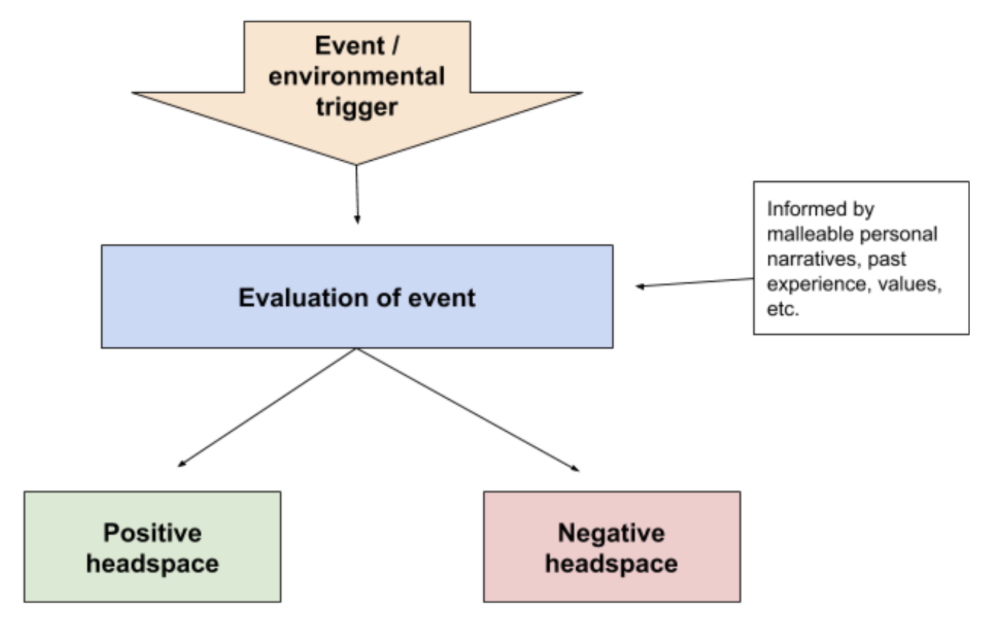Either you manage your headspace or your headspace manages you
/By Duncan Anderson. To see all blogs click here.
Reading time: 4 mins
In secondary school they teach you maths, science, history etc, IMO they should also try to teach you about mental health.
20 year old Duncan thought that if I had a good day it was because good things happened. And if I had a bad day it was because bad things happened. In other words mental health (aka mental headspace) was 100% about external things happening to me.
Today, Duncan in 1st world Australia with a solid income, thinks 90% of my mental health is about internal headspace management.
A rearticulation:
I used to think: good life = doing the right things. Figure out what the right things to do are and doing them means you'll have a good life and doing the wrong things means you'll have a bad life.
Now: good life = doing the right things * doing things right.
For me, ‘doing things right’ is much about headspace management.
“God, grant me the serenity to accept the things I cannot change, courage to change the things I can, and wisdom to know the difference.” Serenity Prayer
So what can one change? IMO actually so much! The way we interpret an event alone can have a major effect on our headspace:
Is challenge good or bad?
Is sacrifice good or bad?
If trauma has happened, do you have post traumatic stress or post traumatic growth?
Are you relaxing by yourself or missing out on something getting FOMO?
All of these things will determine whether we view events positively or negatively, thereby affecting our future actions
Perhaps most importantly, our evaluations are informed by malleable personal narratives. This is where our own power to shape our mental health comes in!
How I used to think:
What I now think is a better characterisation:
In other words...
5. Headspace outcome =1. Environment * 2. Narrative for environment * 3. Event of environment * 4. Event mental processing
Environments always have a narrative. Narratives can happen by default or by design.
Do you want to look after something 24/7 and get no sleep? Sounds like hell right?
What about looking after a newborn (aka 24/7 job with no sleep)? A tiring yet life affirming experience that helped you get your priorities in order?
Sacrifice * Meaning (AKA the right narrative around an environment) = Purpose
Sacrifice * No Meaning (AKA the wrong narrative around an environment) = Suffering
IMO you can't always pick your environment, but IMO you can always have a say in what the narrative is.
Viktor Frankl - “Everything can be taken from a man but one thing: the last of the human freedoms—to choose one's attitude in any given set of circumstances, to choose one's own way.”
I’ve found that narrative creation and cultivation is one core element to headspace management and as such mental health. Also, recognising that often others will have a different narrative to the same environment is key.
As an example with internal Edrolo communications, now much of my time is thinking and communicating about what narrative I feel is most supportive and productive and trying to see if others feel similarly.
Bad event != Bad experience - does it make you bitter, or does it make you better?
There will always be bad things that happen, ‘traumatic’ things that happen.
Given that IMO it’s not possible to stop bad things from happening, when they do happen it’s crucial how one responds. Does one respond with ‘post traumatic stress’ or ‘post traumatic growth’.
Cultivating a ‘post traumatic growth’ mindset is now something I spend time for myself and others. Even just knowing about ‘post traumatic stress’ vs ‘post traumatic growth’ I’ve found extraordinarily helpful.
If you only take away one thing
Sometimes it’s your environment that you need to change.
But I’ve found one needs to have the right narrative for their environment. By considering the way you evaluate events (as informed by personal narratives), you have the power to shape your mental landscape and thereby your tangible outcomes. I’ve found that it’s your job to try to get these components right, I’ve found that it’s others job around you to help as well.
++++++++++
Addendum:
I sometimes break my types of time into these three categories: purpose, play and peace
I try to do:
5 day a week of purpose
1 day a week of play
1 day a week of peace
Mini definitions:
Purpose:
find a way you want to make the world better => take on responsibility to change something => get meaning => get happiness
Or Fun * Meaning = Purpose
Play: Fun * No meaning = Play
Peace: Just doing nothing!
I don’t think one should proactively manage one’s headspace 100% of the time… but also not 0% of the time. I’m mainly trying to proactively manage my headspace during ‘purpose’ time.



